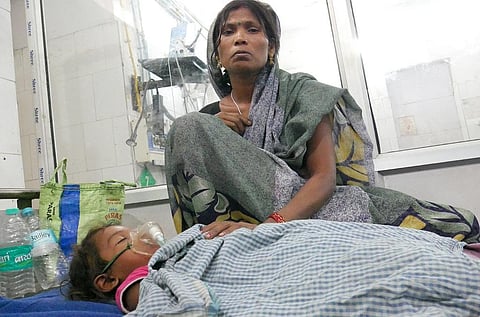

It has been a generation nearly and yet acute encephalitis syndrome (AES) continues to kill at will in Bihar. In between, regimes have changed and reams written on the AES, but not to much effect. Seems something else is acute in the state, apart from the encephalopathy — a lack of awareness.
The brain fever first struck the state in 1995 and has continued taking lives of hordes of children. It claimed lives of more than 170 children in Bihar in 2019.
Role of rural health workers
In a bid to curtail the disease, the Bihar government in 2016 prepared a standard operating procedure (SoP). It was subsequently revised in 2018.
The rural healthcare workers — Accredited Social Health Activists (Asha) and Auxiliary Nurse Midwives (ANMs) — must visit the vulnerable areas in the last week of April to the last week of June to spread awareness and caution parents about do’s and don’ts, according to the SoP.
The SoP mandates these workers to particularly visit families living near litchi orchards with children under 15 and inform parents to not let their children sleep without adequate food.
If the children consumed litchi, they were to be fed even at midnight and their glucose levels should be maintained. The health workers are supposed to provide the parents with ORS packets. They must also provide the families with the phone number of the nearest primary health centre (PHC).
Down To Earth (DTE) visited 10 villages in Muzaffarpur, East Champaran (Motihari) and Sitamarhi districts affected with AES in June. All the 50 families of the deceased children, that DTE could reach out to, denied such awareness drives.
“Neither any Asha worker nor ANM visited our village. They visited after the death of my child, only yesterday, and gave two packets of ORS. I wonder why they are visiting now and giving two packets for five children,” Arun Ram of Ali Neura village of Muzaffarpur’s Meenapur block, told DTE.
Ram lost his four-year-old son in the recent outbreak of AES.
Laxmi Mahato, an extremely backward class (EBC), from Sitamarhi’s Giddha Phulwariya village (Runni Saidpur block) said that an ASHA worker paid visit to his home after the death of his four-year-old daughter.
“They gave two ORS packets for four other children of mine. They told us that we should give adequate food to our children before sleep and also feed them with sugar water. What should I do with this awareness now?” said a distraught Mahato.
All the parents that DTE spoke to in these villages narrated a similar story. DTE found that there were many villages where these health workers did not even visit.
“We never heard about this disease through any medium. Nobody reached out to us. I came to know that there is something called ‘chamki bukhaar’ only after I reached hospital with my son,” Sunil Ram, a daily wager, East Champaran’s Sobhangiya village (Madhuban block).
Sonfi Devi, from Muzaffarpur’s Nizamuddin Koderia (Marwan block), said her two and a half-year old grandson was tired after playing day long and thus refused food at night. She let him sleep empty stomach. He woke up with seizures, after which he was rushed to hospital. He died later.
These stories explain the shoddy awareness about the disease in Bihar.
Lack of awareness about the disease was confirmed even in the ongoing socio-economic survey of AES-affected families in Bihar.
More than 80 per cent of the families did not know that they can avail ambulance service and more than 70 per cent elders were not aware of the disease, according to the preliminary findings of the survey.
Why Ashas did not visit
Orders were not passed by the superiors, claimed the Ashas, while explaining their inavailability.
“We were given the aadesh (order) on June 11 only. For any activity that we undertake, our medical offer gives a written order. We could not do anything before that,” Usha Devi, an Asha worker from Seohar district, that neighbours’ Muzaffarpur.
Sheohar has also witnessed 17 cases and two deaths this year.
Another Asha worker from Muzzafarpur said that the number of ORS packets given to them were in short supply.
“We could hardly distribute more than two packets of ORS which hardly suffice during the season, particularly when a household has 4-5 children,” Lalita Kumari told DTE.
When DTE contacted Bihar’s chief secretary Deepak Kumar, he refused to talk regarding the issue. Sanjay Kumar, principal secretary of health department, however said: “We tried our best to create awareness. We would investigate why it did not work on the ground.”